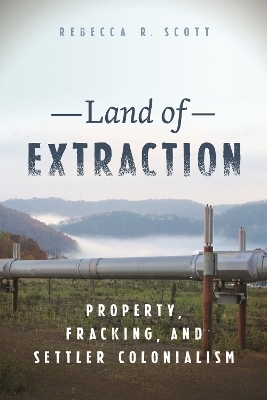
Land of Extraction
Property, Fracking, and Settler Colonialism
Seiten
2024
New York University Press (Verlag)
978-1-4798-2126-6 (ISBN)
New York University Press (Verlag)
978-1-4798-2126-6 (ISBN)
Explores fracking’s dual impact on settler colonial culture and sustainability
Through meticulous research and poignant storytelling, Land of Extraction unravels the complex web of relationships between humans, places, and the environment, all bound by the concept of private property. It presents a thought-provoking analysis of how settler colonial culture imposes limits on environmental politics.
Drawing on real-life events, fictional portrayals of fossil-fuel driven apocalypses, and firsthand ethnographic accounts of the fracking and pipeline boom in West Virginia, Rebecca R. Scott argues that the American dream’s promise of empowerment through property ownership actually restricts action against extractive industries and hampers the progress of environmental justice coalitions.
As the ever-expanding reach of natural gas and pipeline industries takes its toll on communities, the book reveals the fractures in landowners’ reliance on private property, opening the door to more sustainable futures. A powerful call to reevaluate our perspectives and challenge the status quo, this book will leave readers questioning the foundations of our society and the possibilities that lie ahead.
Through meticulous research and poignant storytelling, Land of Extraction unravels the complex web of relationships between humans, places, and the environment, all bound by the concept of private property. It presents a thought-provoking analysis of how settler colonial culture imposes limits on environmental politics.
Drawing on real-life events, fictional portrayals of fossil-fuel driven apocalypses, and firsthand ethnographic accounts of the fracking and pipeline boom in West Virginia, Rebecca R. Scott argues that the American dream’s promise of empowerment through property ownership actually restricts action against extractive industries and hampers the progress of environmental justice coalitions.
As the ever-expanding reach of natural gas and pipeline industries takes its toll on communities, the book reveals the fractures in landowners’ reliance on private property, opening the door to more sustainable futures. A powerful call to reevaluate our perspectives and challenge the status quo, this book will leave readers questioning the foundations of our society and the possibilities that lie ahead.
Rebecca R. Scott is Associate Professor of Sociology at the University of Missouri. She is the author of Removing Mountains: Extracting Nature and Identity in the Appalachian Coalfields.
| Erscheinungsdatum | 07.03.2024 |
|---|---|
| Verlagsort | New York |
| Sprache | englisch |
| Maße | 152 x 229 mm |
| Gewicht | 376 g |
| Themenwelt | Naturwissenschaften ► Biologie ► Ökologie / Naturschutz |
| Technik | |
| ISBN-10 | 1-4798-2126-8 / 1479821268 |
| ISBN-13 | 978-1-4798-2126-6 / 9781479821266 |
| Zustand | Neuware |
| Informationen gemäß Produktsicherheitsverordnung (GPSR) | |
| Haben Sie eine Frage zum Produkt? |
Mehr entdecken
aus dem Bereich
aus dem Bereich
Grundlagen, Systeme, Anwendung, Wirtschaft
Buch | Hardcover (2024)
Carl Hanser (Verlag)
99,99 €


